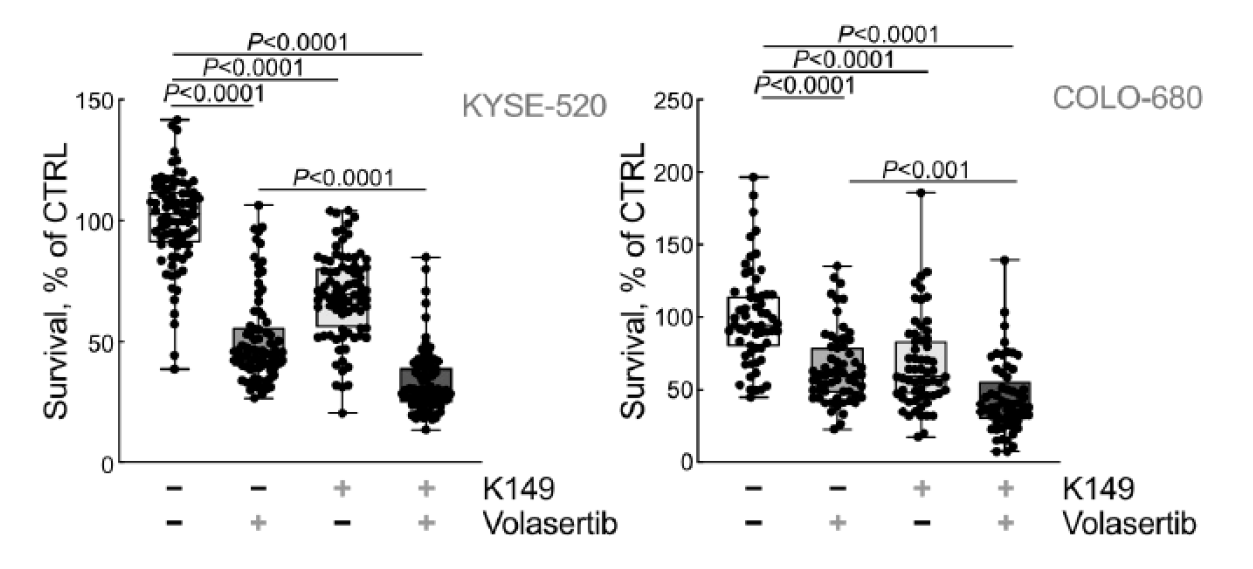In the same section
-
Share this page
Enhanced therapeutic treatment of cancer through synergistic inhibition of SHIP2 and PLK1 [Technology Offer]
The technology in a nutshell
New synergistic combinations of small molecules PLK1 inhibitors and SHIP2 inhibitors as anti-cancer drugs.
State of the art
The invention
The phosphoinositide 3-kinase (PI3K)/mTOR/AKT pathway ranks as the most frequently activated pathway in human cancer. Given the critical role of the PI3K/AKT pathway in cancer progression, multiple inhibitors have been designed to selectively dampen its activation in cancer cells. However, due to the pathway’s ubiquity and its influence on vital physiological functions, these inhibitors elicit side effects that can compromise treatment efficacy. In the PI3K pathway, PI 5-phosphatases, and particularly SH2-containing 5’ inositol phosphates 1 and 2 (SHIP1/2) emerge as pivotal regulating enzymes. Leveraging SHIP2 knockdown in vitro enabled the inventor to show the regulatory influence of SHIP2 expression on esophageal cancer cells survival and adhesion. In addition, pharmacological inhibition of SHIP2 phosphatase activity effectively suppresses esophageal Squamous Cell Carcinoma (eSCC) cell survival both in vitro and in vivo.
The inventors further demonstrated that inhibition of both SHIP2 and PLK1 results in a synergistic effect on eSCC cells as well as cell lines of other types of cancer. Combinations of a SH2 domain-containing inositol 5’-phosphatase 2 (SHIP2) inhibitor and a Polo-like kinase I (PLK1) inhibitor provides therefore a new strategy for enhanced combined treatments of cancers, and in particular cancers overexpressing SHIP2 due to INPPL1 amplification.
Key advantages of the technology
- New synergistic combination treatment against cancer based on PLK1 and SHIP2 inhibitors.
- in vitro and in vivo efficacy demonstrated in pre-clinical studies.
Technology readiness level

TRL-3 Proof of concept: synergistic inhibition of esophageal squamous carcinoma and other cancer cell lines in vitro and first in vivo results on xenotransplanted mice demonstrating potential for development of enhanced combined treatment of cancer.
Laboratory and Inventor

Relevant publications
- SHIP2–PLK1 crosstalk promotes sensitivity to dual inhibition in esophageal squamous cell carcinoma.
Molecular Cancer in press (2025). doi: https://doi.org/10.1186/s12943-025-02454-z

SHIP2 Inhibition In eSCC Cells Enhances Sensitivity To PLK1 Inhibitor
Percentage of eSCC cell survival measured after a 72-hour treatment with DMSO, K149, Volasertib or the combination of K149 (SHIP2 inhibitor) and Volasertib (PLK1 inhibitor) in cell lines KYSE-520 and COLO-680.
Download the offer in PDF
Keywords
- PLK1
- SHIP2
- Small molecules inhibitors
- Synergistic Combination
- Cancer
Collaboration type
- Collaborative R&D (preclinical, early clinical)
- Licensing
IP status
PCT/EP2025/069661
Priority date:
10/07/2024
Inventors
Contact
ULB Research Department
Joachim Ruol
Business developer
joachim.ruol@ulb.be
